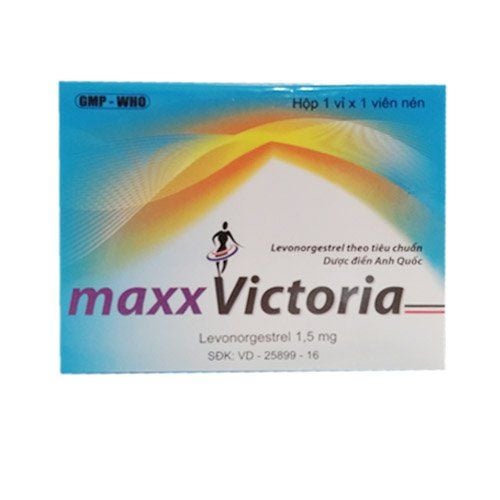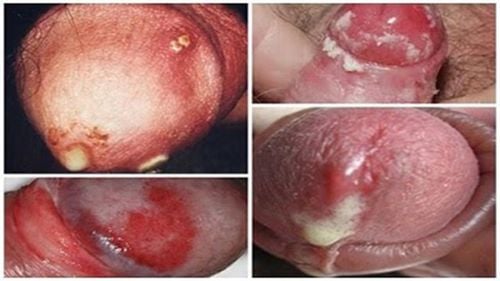This is an automatically translated article.
The article was professionally consulted with Master, Doctor Tran Thi Vuong - Doctor of Microbiology - Laboratory of Laboratory - Vinmec Hai Phong International General Hospital.Gonorrhea is one of the sexually transmitted diseases, which can seriously affect the health and fertility of both men and women, in some cases, people with gonorrhea will have symptoms similar to Chlamydia. , Candida and genital inflammation.
1. What is gonorrhea?
Gonorrhea is a sexually transmitted disease caused by the Gram-negative bacteria Neisseria gonorrhoeae. This is a fairly common sexually transmitted infection. The disease can be combined with some other agents that cause genital urethritis such as: Chlamydia trachomatis, fungi, flagellates, Mycoplasma, Ureaplasma,...Symptoms of gonorrhea in men and women are often different. Usually, gonorrhea in men has quite obvious symptoms, while women are not clear or have no symptoms. Common symptoms are:
Men: Usually anterior genital urethritis with painful urination and green or yellow-green pus, a lot of pus, edema, red mouth. The incubation period is 1-14 days, with an average of 2-5 days. If untreated, the patient may experience local complications such as: posterior urethritis, epididymitis, acute or chronic pancreatitis and prostatitis,...; Female: Often with inflammation of the uterine tubes, urethritis and glands. The incubation period for gonorrhea is about 10 days. Common symptoms are vaginal discharge, difficulty urinating, menorrhagia, bleeding between menstrual periods,... Complications of gonorrhea in women are very serious, including salpingitis, pelvic inflammatory disease, which can cause Infertility, ectopic pregnancy,... Pregnant women with gonorrhea are prone to complications of acute chorioamnionitis, spontaneous abortion, premature rupture of membranes, premature delivery, neonatal conjunctivitis, inflammation In addition to the above complications, people with gonorrhea regardless of men or women are at risk of complications of systemic gonorrhea infection: Polyarthritis, appearance of painful necrotic pustules on red, painful skin Osteoarthritis or synovitis tendonitis, etc. Occasionally, patients with gonorrhea can develop gonococcal septicemia, meningitis, and gonorrhea pericarditis, which can be life-threatening.

2. Differential diagnosis of gonorrhea with Chlamydia, Candida, genital inflammation
2.1 Definitive diagnosis of gonorrhea The doctor will differentiate gonorrhea from Chlamydia, Candida, and genital inflammation through history of sexual intercourse with someone who has gonorrhea or on the basis of clinical symptoms. of the patient.To be sure, the doctor may order the patient to perform tests such as:
Culture: Isolation of gonorrhea by culture to diagnose the disease. The positive rate of gonococcal culture in men is about 80-95% depending on the sampling site (100% in the male urethra and lower in the pharynx and rectum due to the small amount of gonorrhea there). The positive rate for gonococcal culture in women is higher than when taking samples from the cervix (80 - 90%), lower when taking samples from the urethra, glands, throat and anus; Gram stain: When typical gram-negative diplococci are found in or adjacent to polymorphonuclear leukocytes, it can be concluded that the patient is positive for gonorrhea. In the case of only diplocytosis outside the leukocytes or the atypical leukocyte morphology within polymorphonuclear leukocytes, re-examination should be performed; PCR (polymerase chain reaction): is a new technique with high sensitivity and specificity for diagnosing gonorrhea when gonorrhea is positive. 2.2 Differential diagnosis of Gonorrhea with Chlamydia, Candida, Genitalitis most common sexually transmitted diseases and there is a 30% risk of co-infection with gonorrhea. Chlamydia disease has similar manifestations to gonorrhea, causing subepithelial inflammation, epithelial ulceration and scarring, but Chlamydia Trachomatis bacteria rarely cause systemic infections.

To confirm the diagnosis of Chlamydia infection, it is necessary to do more tests such as PCR Chlamydia, ELISA for IgA, IgG, IgM or Chlamydia rapid test for Chlamydia bacterial antigen...
Candidiasis 80% of cases are caused by Candida albicans; strains such as C.glabrata, C. tropicalis, C. krusei are less common. Distinguishing gonorrhea from candidiasis is mainly based on clinical symptoms. Specifically, men rarely have candida urethritis, often with subtle symptoms, not clear, can see little mucus in the mouth, itching, inflammation of the foreskin - foreskin (manifested as having one or more abrasions on the glans and foreskin, pruritic, round, bright red, well-defined, bordered margins), itching; rarely painful urination, frequent urination, sometimes blood in urine; Infection by having unprotected sex with a partner who has a vaginal yeast infection.
Females infected with Candida have symptoms of vaginal discharge, white like whey, intense itching, burning sensation in the vulva, vagina, especially before menstruation, pain during intercourse In combination, the vulva is red and edematous in whole or in clusters. Endogenous fungal diseases caused by local changes or systemic disease causing disease (diabetes, pregnancy, poor menstrual hygiene, after abortion, after menstrual regulation suction, urological procedures - genitalia, changes in vaginal pH).
In addition, other tests can be performed to distinguish gonorrhea from candidiasis, such as: fungal spore test + pseudofilamentous fungus or identification of fungi on Sabouraud's medium.
Genital inflammation Trichomonas vaginalis: Usually causes vaginitis with symptoms including itching in the vulva, vagina, vaginal discharge, yellow or green pus discharge, strong odor, vagina stinging pain, swelling, redness, many ulcerated sites; Vaginal examination showed a lot of liquid discharge, with many small bubbles. Pinworms can also cause genital urethritis in men, but the symptoms are more subtle, mainly penile itching, painful urination, frequent urination and less mucus secretion. This is a sign that helps distinguish gonorrhea from genital inflammation. In addition, the two diseases can be distinguished by performing a smear test for flagella;
Genital urethritis caused by Mycoplasma, Ureaplasma: These two bacteria often cause genital infections, with symptoms similar to Chlamydia Trachomatis infection, so they can be distinguished from gonorrhea by clinical symptoms. They belong to the group of agents that cause urethritis, cervicitis not due to gonorrhea and not due to Chlamydia. Some large hospitals can also perform tests to determine the cause of genital urethritis caused by Mycoplasma and Ureaplasma for differential diagnosis with gonorrhea in order to have the most accurate treatment regimen.
Gonorrhea and sexually transmitted diseases such as Chlamydia, genital inflammation, and Candida are all at high risk of getting infected if having unprotected sex. Symptoms of the disease have many similarities and differences, difficult to pinpoint. Therefore, when there are warning signs of the above diseases, it is best for the patient to go to the hospital for examination, accurate diagnosis and timely and effective treatment.
Vinmec International General Hospital offers a Package of Examination and Screening for social diseases to help customers detect diseases early and have effective treatment and prevent dangerous complications. The screening package for social diseases at Vinmec is for all ages, both men and women.
Please dial HOTLINE for more information or register for an appointment HERE. Download MyVinmec app to make appointments faster and to manage your bookings easily.














